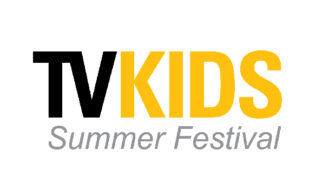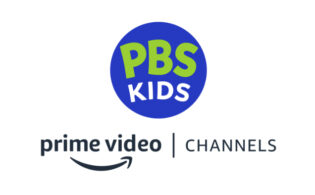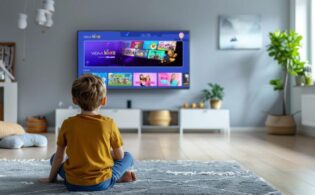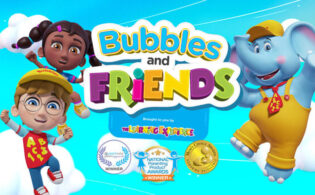The third edition of the TV Kids Summer Festival kicked off today with Kidoodle.TV’s Brenda Bisner, HappyKids’ David Di Lorenzo, Canela Kids’ Maggie Salas-Amaro and Playground TV’s Daniel Nordberg talking about the acquisition strategies at their AVOD services.
Bisner is the chief content officer for A Parent Media Co. (APMC), which operates Kidoodle.TV. Di Lorenzo serves as senior VP of kids and family for Future Today, the parent company of the HappyKids service. Salas-Amaro is director of Canela Kids, part of Canela Media. Nordberg is the founder of Playground TV. They took part in a panel conversation with TV Kids’ Kristin Brzoznowski that you can see in its entirety here.
The conversation began with Brzoznowski asking the panelists to weigh in on what’s driving gains in the kids’ AVOD segment.
“There’s a lot of subscription cutting,” said Bisner on the streaming landscape today. “There are issues with the economy. There is a desperate need for content with no barrier to entry for kids and families globally. The drive for kids’ AVOD comes from parents being younger and having grown up with the internet and, of course, knowing the dangers that kids can face online and making wise decisions and researching where their children can safely view content.”
Di Lorenzo added: “It is about transitioning audiences. In the U.S., we lost about 6 million subscribers on cable and satellite last year. There’s been a paradigm shift in where audiences are going to watch content. Through the pandemic, we saw triple-digit growth in audiences. That slowed a little bit last year into high double digits. Audiences are moving into streaming now, and that’s where they find most of their content.”
Salas-Amaro heads up Canela Kids, which is aimed at the U.S. Hispanic and Latin American markets. “It was important to showcase well-known franchises to both the kids and the parents,” said Salas-Amaro on the newer platform’s strategy. “We promote our space as safe, 100 percent in Spanish and an always free environment for our families.”
For Nordberg at Playground TV, “getting multilingual content throughout Europe is a key driver for growth in this region with all the different languages you have across Europe.”
As for how much content each of these services is buying, Di Lorenzo said HappyKids has been “aggressive in acquiring content. Kids are watching a lot of different types of formats, a lot of different types of content. We’ve got a mix of studio-produced content, YouTube influencers, UGC, gaming. We have very strict standards and practices, making sure that we have a safe environment for kids to watch this content. Last quarter we brought in about a thousand half-hours.” Of that lineup, about two-thirds was studio-produced content from global producers. “The rest of that was YouTube content. And that was just in terms of new IP. We’ve got monthly refreshes coming in from partners like Moonbug and others who are bringing in new content on a monthly basis.”
Canela Kids is also working with Moonbug, Salas-Amaro noted. “We took advantage of the fact that they had new content coming in that wasn’t available on other Hispanic streamers. We were able to capitalize on that. We’ve rolled out anywhere from 1,700 to 2,000 hours in the last year. We have about 3,000 hours right now on our platform.”
Playground, a relatively newer entrant, is still building on its portfolio, Nordberg said. “We’re trying to increase it as much as possible to cater to the European audience.”
Kidoodle.TV, meanwhile, has been in operation since 2012 and, as such, has a “robust catalog,” Bisner noted. “We’re serving kids under 12 in 160 countries. It’s curating the biggest brands in the world. It’s not a quantity play but a quality play for us. We own the word Safe Streaming. We want partners that care about that mission and what we’re doing to better the children’s experience online around the world, matched with philanthropic endeavors. We want partners who are going to talk about being on Kidoodle.TV. We want brands that will plant the seeds and continuously water the plants. We have a backstage analytics portal, which is very transparent, and it’s quality revenue. We want our partners engaged. This is a relationship, and that’s very important in AVOD.”
Bisner added that IP owners doing business in the AVOD space need a “social strategy. With the right execution, it does help elevate a brand. There’s a lot out there right now. There’s a lot to choose from. What’s going to get the attention of the parents that are scrolling?”
The conversation then moved to acquisition wish lists for each of the services. “We’re not just looking for back catalog,” Bisner said. “We’re looking for brands with significant awareness and partners that are engaging.” She referenced Kidoodle.TV’s recent pact with the Dude Perfect YouTube brand.
At Canela Kids, “We want to tell stories from a kid perspective,” Salas-Amaro noted. “I think we need to be telling more stories about culture. I don’t see that out there. We’re not looking so much for preschool. We’re looking more for 7 to 9 and family-oriented titles.”
At Playground, “We’re looking for the European favorites,” Nordberg said. “Barbapapa in France, Fix and Foxi in Germany; they resonate with parents. We’re going after those classics and newer productions of those.”
Live action and movies are on Di Lorenzo’s wish list at HappyKids. “We’re also looking for new ways to work with partners, whether that is a spin-off series or something that maybe is exclusive to our audience. It’s working with partners to find new ways to bring exciting content around a brand they’re already familiar with. We’re 0 to 12, but our focus lately has been on juggernauts in the preschool space, whether it’s Cocomelon or DuckTales or PAW Patrol. We’ve got a very strong presence in preschool. One of the challenges for us is trying to find that older audience content.”
As for gaps in the market, Bisner highlighted the need for more diverse content. Di Lorenzo agreed and also pointed to the lack of live-action sitcoms. “We’ve found some gems from Australia and other places in the world that have worked well for our audience. But that’s always a format that’s tough for us.”
The lack of culturally resonant kids’ content for Spanish-speaking audiences led Canela Kids to commission its own original series Súper Ellas, Salas-Amaro explained. The animated series highlights Latina trailblazers. “I’d like to see more of that.”
Brzoznowski then asked the panelists about deal structures. HappyKids is doing flat-fee licensing, advanced minimum guarantees and revenue shares, Di Lorenzo said. “It depends on the content, the exposure the content has across other platforms and how well it’s known across our audience. There’s no one set structure for us in operating with partners. We want to bring partners in and make sure that we do the best job we can to support their content, make sure that their content is seen and that it’s given an opportunity to shine on our network.”
It’s a similar situation at Canela Kids, Salas-Amaro added. License fee models are preferred over rev-shares, “unless it’s a FAST opportunity. A minimum guarantee depends on who it is. It depends again on the property and what it will bring to the platform ultimately.”
“Being a young company, it’s fairly expensive to build a good content portfolio,” Nordberg said. “We are limited, and we only do revenue-share deals with no minimum guarantees. That’s our structure to build our portfolio.”
APMC is a tech company, Bisner said, with the ability to accurately measure how shows are faring. “Estimations can be made around brands that we know have already been successful with us. We pay a CPM rate that’s not advert dependent, and all of our adverts are vetted for kids and not interrupting the show, which we are very serious about. We have been a new revenue stream for a lot of people. You want eyeballs and revenue, right? You want to reach kids, and how you’re reaching kids should matter. Just putting it anywhere and not knowing what it’s sitting next to, what it looks like on the service and how other things may be found are considerations that need to be put on the table before making any deal. We feel we have a very fair deal structure. Every conversation has to be different, especially the bigger the brands are, especially what their needs are. It’s a dialog.”
On the role of exclusivity in AVOD, Bisner noted, “There’s no such thing as exclusivity in AVOD. We have a lot of similar brands. We all know the same people. So how is it going to be different for David? How is it going to be different for me? How is it going to be different for Maggie and Daniel? That’s important. What’s that conversation, and how are the two companies going to cross-promote in a way that’s going to make sure it has exposure and people are going to go there to watch it? That’s the bottom line.”
Salas-Amaro agreed, adding: “When we acquired the Moonbug package, it was on another Hispanic streamer. But since we had done a deal after they did their deal, we got new stuff. That was the competitive advantage that we had. Cocomelon is all over the place, and so are the other shows, but we’re coming in with new seasons, and we had two new shows that were not part of the package that another streamer had. Now their license is over, and we are the ones that are owning the space.”
“We work toward exclusive packages in some instances,” Di Lorenzo noted. “Some of this content is across multiple platforms, so whether it’s an exclusive special or something we can say to our audience, we’re bringing something new to you that’s different. Future Today is a publisher of apps. We publish apps for a lot of different brands. So it may not be exclusive content, but we’re the largest place to find that content. Whether we’re talking about the LEGO app or the Cocomelon app or the Blippi app, these are destinations that have an entire portfolio of content. In that respect, it’s not necessarily exclusive, but it’s the destination hub to find everything under a specific brand.”
Exclusivity doesn’t “go hand-in-hand with a revenue-share model only,” Nordberg added. “Exclusivity demands some kind of commercial commitment, which we are too young to take on board.”
On the role of originals in AVOD, Salas-Amaro said Canela Kids’ move into that space was a natural evolution given the investments its parent company, Canela Media, has been making in Spanish-language content across its portfolio. A third original, focused on the environment, is planned for next year.
Kidoodle.TV has also been investing in originals. “We’re not someone you would call for co-production or gap financing,” Bisner said. “Our originals are made in-house with our incredibly creative team.” She added: “We’re taking very analytical approaches to our decision-making there.”
Similarly, Di Lorenzo said HappyKids is not at the point where it would “co-produce a studio-produced show. That’s something we’re interested in exploring, but not sure 2023 will be that year. We work with many gamers and have a lot of user-generated content. It gives us an opportunity to create thematics around some of this gaming content, as well as making sure that it fits into our standards and practices.”
Nordberg said that Playground has been exploring the AI space. “At the beginning of this year, we started to develop another service called Storyplai where users can create their own stories. These are right now audio-only, but it’s really interesting what you can do with a tool like that. For us, AI would play a bigger part in our future when it comes to producing original content.”
The programmers then discussed what they have learned about how kids are engaging with content on AVOD. “What is toward the front of any row is going to get more attention than anything that is passed the fifth or the sixth poster,” Salas-Amaro observed. “It’s the same with the linear [FAST] channels.”
Di Lorenzo agreed, noting that it’s generally the “usual suspects”—well-known brands—that kids will flock to. “We try to make sure that we’re promoting these shows by using banner ads and billboards in different spots. One of the great things about AVOD is that we do have the ability to have a large catalog of content that allows our users to search and find things. It’s nice to have a lot of content available for kids to watch because they want to explore. This platform allows us an opportunity to create an environment to find a little bit of everything you want to watch.”
Bisner added: “Shows have to compete against the usual suspects. Peppa, PAW Patrol. How are you going to hold up? It goes back into that social strategy and that brand packaging and how it is special for being on that platform.”
She continued, “Long-form content is the bastion; it’s sticky. It keeps kids there for longer. Retention is very high. That’s important for us. We’re looking to make time and space for the brands that will come out and do well and then invest more time into the ones that are doing well and adding more.”
The panel wrapped with a discussion about FAST channels. At Canela Kids, “We premiere some of the titles first on the FAST channels and then we move them on to AVOD,” Salas-Amaro explained.
Di Lorenzo said Future Today operates a range of FAST channels and brought a FAST experience into the HappyKids AVOD app. “The FAST channels we’re launching are branded around a specific brand. Kids are not a lean-back audience; they lean in, and they want to watch what they want to watch. We’ve got about ten FAST channels in HappyKids right now, and we plan to expand that because we’ve seen that our audience is gravitating toward that viewing experience.”
Kidoodle.TV is also operating in the FAST space, Bisner said. “We’re looking back at traditional models of television programming. How can we update it? We’re looking at day-parting. What can we bring to an audience in the morning, afternoon, evening and then on the weekend to make it special? What kind of promotion can be done around that? We’re exploring how we can show up in a way that is more eventized and leads to some social cross-promotion.”
 TVKIDS
TVKIDS






